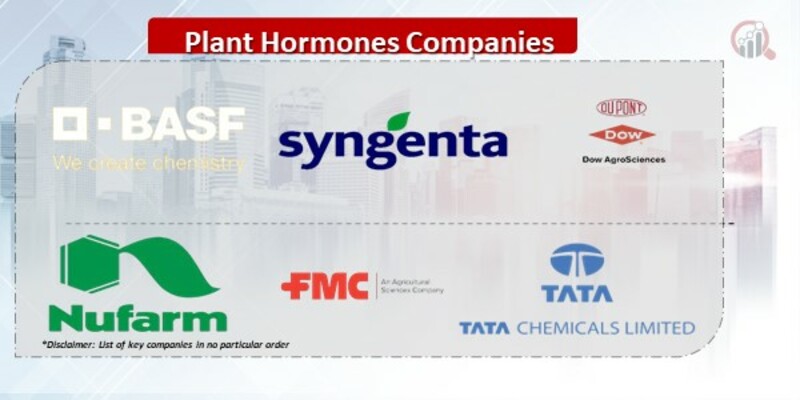Top Industry Leaders in the Plant Hormones Market
Global Plant Hormones Market Outlook

The competitive landscape of the Plant Hormones Market is marked by intense rivalry among key players, as they strive to capitalize on the growing demand for plant hormones in agriculture and horticulture. The market is witnessing a surge in innovation and research activities, driving companies to adopt strategic measures to maintain or gain a competitive edge.
Key players in the Plant Hormones Market include
- BASF SE
- Syngenta AG
- The Dow Chemical Company
- Nufarm Australia Ltd.
- FMC Corporation
- Bayer CropScience AG
- Adama Agricultural Solutions Ltd.
- Tata Chemicals Ltd.
- Shanghai Xinyi Industry Co., Ltd.
- Valent BioSciences Corporation
Strategies adopted by these market leaders revolve around product development, mergers and acquisitions, and geographical expansion. For instance, BASF SE has been actively involved in launching innovative plant hormone products, strengthening its position in the market. Syngenta AG, on the other hand, has pursued an acquisition strategy, acquiring companies to broaden its product portfolio and extend its reach in key markets. Bayer Crop Science focuses on strategic collaborations with research institutions to enhance its research capabilities and bring cutting-edge solutions to the market.
Market share analysis in the Plant Hormones Market is influenced by various factors. The effectiveness of plant hormone products, regulatory approvals, pricing strategies, and distribution efficiency play crucial roles in determining a company's market share. Companies that invest in developing sustainable and environmentally friendly plant hormone solutions are gaining favor among environmentally conscious consumers and governments promoting sustainable agriculture practices. Furthermore, companies that establish strong relationships with farmers through educational programs and support services tend to secure a loyal customer base, contributing to market share growth.
The Plant Hormones Market is not only dominated by established players, but it also witnesses the emergence of new and innovative companies striving to make their mark. These emerging players often focus on niche segments, offering specialized plant hormone products that address specific agricultural challenges. These companies leverage agility and innovation as their key strengths, positioning themselves as disruptors in the market. As they gain traction, established players may face increased competition, prompting them to adapt their strategies to maintain their competitive positions.
Industry news in the Plant Hormones Market reflects the dynamic nature of the sector, with constant developments and breakthroughs. For example, advancements in biotechnology have led to the development of genetically modified plants that exhibit enhanced responsiveness to plant hormones. This has opened up new avenues for companies to explore and capitalize on genetically engineered plant hormone solutions. Additionally, the increasing awareness of the role of plant hormones in sustainable agriculture has spurred investments in eco-friendly and organic plant hormone formulations.
Current company investment trends in the Plant Hormones Market highlight a focus on technology and sustainability. Companies are investing in advanced research and development facilities to accelerate the discovery of novel plant hormone compounds. Sustainability is a key driver, with companies investing in environmentally friendly production processes and packaging. This trend aligns with the growing consumer demand for sustainable and ethical agricultural practices.
The overall competitive scenario in the Plant Hormones Market is characterized by a mix of intense competition among established players and the potential disruption caused by innovative newcomers. As the market continues to evolve, companies must adapt to changing consumer preferences, regulatory landscapes, and technological advancements. A proactive approach to research and development, strategic collaborations, and a commitment to sustainability will be crucial for companies aiming to thrive in this competitive and dynamic market. The Plant Hormones Market is poised for continued growth, driven by the increasing global population's demand for food, coupled with the need for sustainable and efficient agricultural practices.
Recent News :
October 26, 2023 - The plant hormones market is experiencing a surge, fueled by a growing appetite for sustainable and efficient agriculture. This week, several developments highlight the exciting trends shaping the industry:
Biostimulants Steal the Spotlight:
Valagro, a leading Italian player, acquires Brazilian biofertilizer firm Microflora: This strategic move expands Valagro's reach in the thriving South American biostimulant market, estimated to reach $2.5 billion by 2028.
Start-up Indigo Agriculture secures $450 million in funding: The company's bio-based crop treatments, including plant hormones derived from microbes, are attracting major investors due to their promise of increased yields and reduced reliance on synthetic chemicals.
Digital Farming Takes Root:
Syngenta partners with data analytics firm Granular to optimize hormone application: Their joint platform uses field data and weather forecasts to recommend precise hormone dosages for individual plants, maximizing yield and minimizing waste.
BASF launches "FarmHbeat," a digital platform for integrated crop management: This platform includes recommendations for hormone use based on real-time data, providing farmers with a one-stop solution for optimizing their operations.
Regulatory Landscape Shifts:
The European Union proposes stricter regulations on plant biostimulants: This raises concerns about potential delays and increased costs for bringing new biostimulant products to market.
California relaxes rules for certain plant growth regulators: This move could open doors for innovative hormone technologies in the US market, potentially boosting competition and product diversity.
Sustainability Takes Center Stage:
Bayer Crop Science invests in research on drought-tolerant plant hormones: This initiative aims to develop hormones that help crops withstand water scarcity, a critical concern in the face of climate change.
Start-up Plant Bioscience raises $100 million for its nitrogen-fixing technology: This technology uses plant hormones to encourage symbiotic bacteria that fix atmospheric nitrogen, reducing reliance on synthetic fertilizers and promoting sustainable farming practices.












